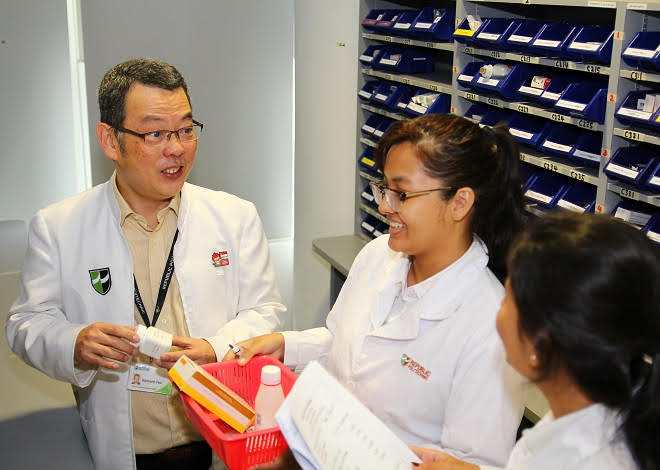When Mr Richard Yeo decided to take pharmacy as a course in the 1980s, he saw it as an industry that would guarantee him a job and, more importantly, a pay cheque.
After all, he had grown up in a poor family, with few creature comforts provided by his hawker parents.
“You see, the healthcare industry – doctors, nursing, pharmacy – needs the human touch. You can’t replace it with a machine, no matter what you do,” he says.
What he didn’t expect was a career that took him from pharmaceutical retail to leading a pharmaceutical giant into China. But after mastering his trade in a gruelling 30-year career, Richard isn’t done yet.
He is teaching the next generation the pharma trade as well as imparting essential values.
“You know, some of these kids just need a mentor to help them get the opportunities they could not get on their own. With my experience I believe I am providing them with something textbooks don’t teach,” says the 57-year-old Republic Polytechnic lecturer.
After graduating, he spent a few months as a retail pharmacist before applying for a job at Beecham Pharmaceuticals at its antibiotics manufacturing plant.He rose from a junior production pharmacist to managing an entire unit of the plant, overseeing 30 staff at one point.
But he realised, very early in his career, that to move up, he had to keep upgrading his skills and take the leap when opportunity knocked. Or, in Richard’s case, called on the phone: his career was transformed by four phone calls.
The first came from one of his former university lecturers. The professor had been hired to oversee clinical trials at Astra Asia and he wanted Richard to help with the registration of new products and coordination of clinical trials.
Despite spending five years at Beecham doing production, he had no knowledge of how to register products. But that was precisely why he decided to leave his relatively well-paying job behind: for the learning opportunity.
“I thought: Look at what I can learn from here. And because he’s willing to offer me the training and the patience, it didn’t matter if I started from scratch,” he says.
After that, the second phone call came from a headhunter, who offered him the role of a clinical trials director at Sterling Pacific, the over-the-counter medicine arm of pharma giant Sterling Winthrop-Kodak. The company’s most famous product is Panadol.
He rose quickly in this company too, impressing his bosses with his knowledge of Asia and his hard work. Eventually he was called upon to take on one of the biggest projects the company had – bringing Panadol to the Chinese market.
Getting Panadol registered with the drug administration body in China meant getting Chinese officials to approve the drug. But these officials were notoriously difficult to contact and even harder to persuade into action.
Fortunately, one of his friends knew Mao Zedong’s nephrologist, who agreed to make a phone call to help facilitate a meeting between the officials and Richard’s team.
This third phone call helped him end his company’s 10-year quest to break into the Chinese market, the highlight of his corporate career.
“This Chinese nephrologist was so influential that all he had to do was to make a call and I got to see the people in charge,” he says.
The last phone call that changed the trajectory of his career came from his former university mate. She was leaving a small generic drugs company and wanted him to take her job as the general manager.
The firm was a subsidiary of a larger Malaysian company. The offer was to turn the loss-making company around and if he managed to do that, he could own it.
It was 1997, at the height of the Asian Financial Crisis and he was contemplating leaving behind a well-paying job to jump into a sea of risk. For most people, this would have been a crazy suggestion.
But he did it anyway, taking an 80 percent pay cut along the way.
“When you are about 42 to 44, if you don’t do it [then], you’ll never do it,” he says, adding that the firm was later acquired after he successfully turned it around.
Richard went on to set up his own consultancy, running it for several years before moving into teaching at Republic Polytechnic.
While the phone calls were pivotal turning points, Richard believes that it was his hard work, a desire to continuously learn and take risks to do new things that contributed most to his success.
Hence he tells his students that although a degree or diploma is an important step to take in getting started in a career, to succeed over the long-term, a keen curiosity, a desire to master one’s skills and a passion for taking on new experiences will be crucial.
“Everybody has the potential to master whatever skills they want, provided they put in the effort, are humble and willing to learn,” he says. “Some will be fast learners, some take longer, but it doesn’t matter – you will get there.”
“If you equate mastery of skills with a good-paying job, I think that’s not right… [A] master of skills is someone who has learnt the trade, who has been able to take it to the next step.”
For Richard, teaching was that “next step”. It is something meaningful that he looks forward to each day.
“Having seen the difference I could do, I feel good,” he says. “I feel very good.”
Article & Photo from Schoolbag website


